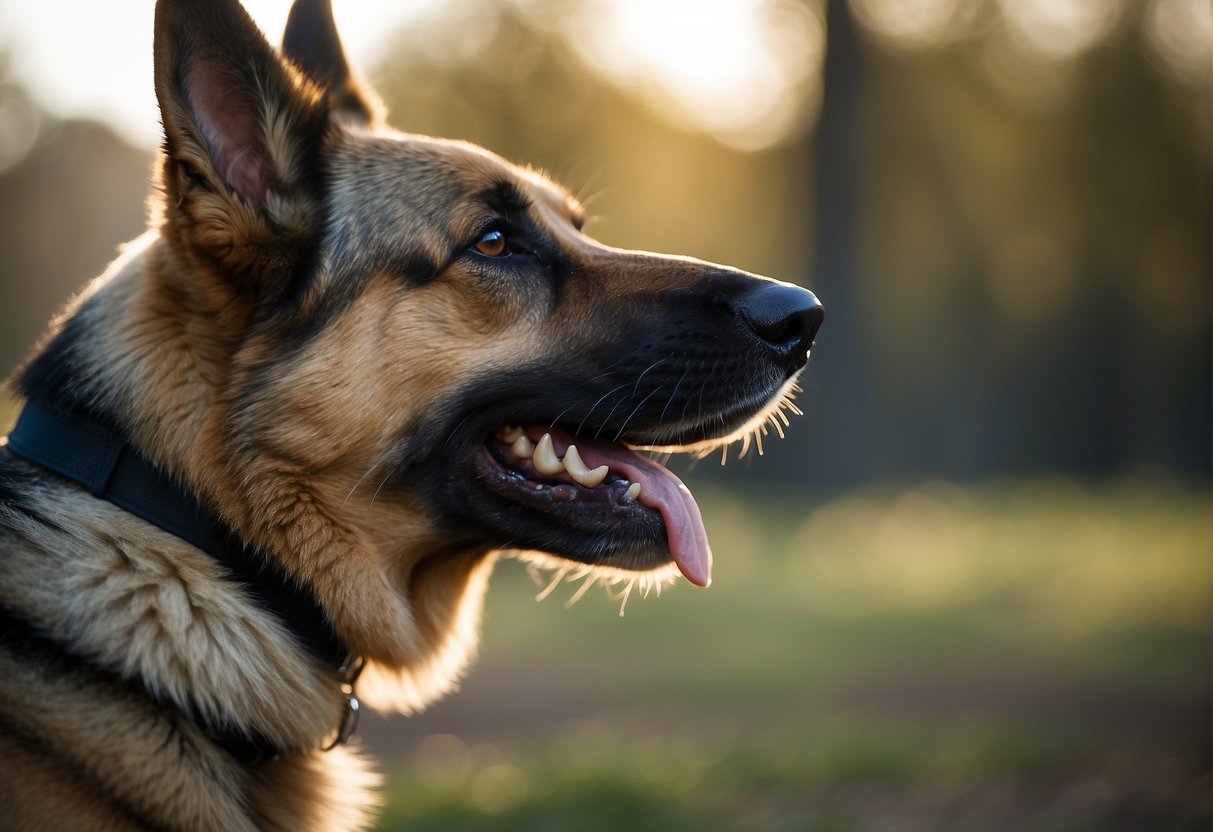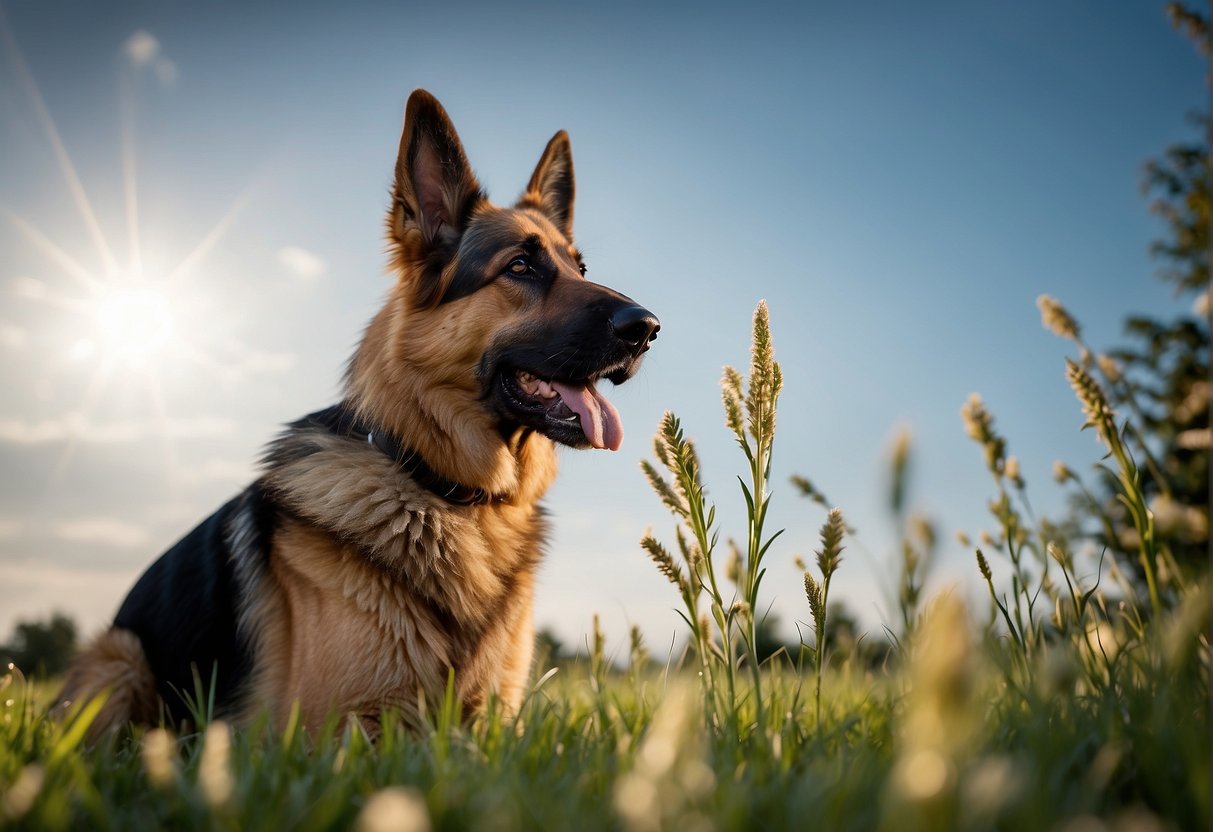As a retired police officer who’s had the privilege of working alongside police German Shepherds for over three decades, I’ve witnessed firsthand just how incredible these dogs are.
But one question I often get asked is, “How good is a German Shepherd’s sense of smell?” Having spent years in the field with these furry partners, I’ve seen their olfactory capabilities in action, and it’s nothing short of astounding.
German Shepherds boast a superb sense of smell, 100,000 times stronger than humans! Their 225 million scent receptors and large nasal cavities make them stars in detection work, from sniffing out criminals to finding lost souls. Their olfactory abilities are highly valued for various tasks.
Their noses have saved the day more times than I can count, from tracking down suspects to finding a lost child in the wilderness.
In this blog, I’ll explore what makes the German Shepherd’s sense of smell extraordinary, share some personal stories from the field, and maybe even debunk a few myths.
Join me as we explore the fascinating olfactory world of German Shepherds!
Key Takeaways
- German Shepherds have a highly developed sense of smell, enhancing their ability to perform certain jobs.
- Their advanced olfactory abilities are the result of both their anatomy and their breeding history.
- The sense of smell greatly influences German Shepherds’ behaviors, communication, and overall health.

Anatomy of a German Shepherd’s Sense of Smell
German Shepherds possess amazing senses, including picking your mood, especially if you are anxious or sad.
They also have an extraordinary sense of smell thanks to a sophisticated olfactory system with many scent receptors and specialized structures.
This allows them to detect scents far beyond human capabilities.
Sensory System Overview
Your German Shepherd relies heavily on their sense of smell, which is vastly superior to that of humans.
The foundation of their smelling capability is the olfactory epithelium—a complex tissue inside the nasal cavity that houses scent receptors.
These receptors bind to odor molecules and send signals to the brain, allowing your dog to interpret various scents.
Olfactory Receptors and Olfactory Bulb
German Shepherds are endowed with an estimate of up to 225 million scent receptors in their olfactory epithelium, far more than the 5 million typically found in humans.
When an odor is detected, it binds to these receptors, and the signal is transmitted to the olfactory bulb.
This part of the brain is particularly large in dogs, which processes the smell information and allows your German Shepherd to differentiate between various odors.

Vomeronasal Organ and Pheromones
Additionally, your German Shepherd’s olfactory system includes the vomeronasal organ (VNO), also known as Jacobson’s organ.
This separate sensory system detects pheromones, the chemical messengers used for communication between members of the same species. The VNO plays a crucial role in social interactions and behavioral responses to the environment.
Comparative Scent Detection Abilities
When you’re considering scent detection, it’s fascinating to compare the abilities of German Shepherds with humans and other dog breeds.
German Shepherds have a highly developed sense of smell that surpasses that of humans and is on par with the best scent-detection dog breeds.

German Shepherds vs. Humans
Your sense of smell is like a faint whisper compared to the powerful shout of a German Shepherd’s olfactory capabilities.
Humans typically have around 6 million olfactory receptors in their noses, whereas a German Shepherd boasts up to 225 million.
This makes their sense of smell over 10,000 times stronger than yours, allowing them to detect odors at extremely low concentrations.
German Shepherds vs. Other Dog Breeds
Comparing German Shepherds to other dog breeds often highlights their excellence in scent detection tasks.
While all dogs have remarkable smelling abilities, breeds like Beagles and Bloodhounds are often recognized for having some of the strongest senses in the canine world.
Beagles have been observed for their prowess in detecting agricultural contraband, and Bloodhounds are renowned for their tracking abilities.
German Shepherds don’t lag far behind. Due to their keen scent-detection abilities, they excel in various detection roles, such as search and rescue, police work, and even cancer detection.
Their proficiency in differentiating between complex odors makes German Shepherds reliable when accurate scent detection is crucial.
Your German Shepherd is not just a companion but a highly skilled detector that can be trusted in critical missions requiring a keen sense of smell.
Behavioral Aspects of Smelling

The behavioral nuances of a German Shepherd’s sense of smell have a profound impact on their capabilities in tracking and hunting, emotional and social detection, and their trained roles in various specialized tasks.
Tracking and Hunting Behaviors
German Shepherds have an acute sense of smell, which allows them to excel at tracking.
Their natural ability to follow a scent trail makes them invaluable in hunting scenarios. This powerful skill is also why they’re often employed in law enforcement to track down missing persons or suspects.
Their obedience and temperament make them ideal companions for these high-stakes situations.
Emotional and Social Responses
Your German Shepherd’s sense of smell helps them perceive not only physical paths but also emotional trails.
They can detect changes in your scent that might indicate fear, anger, or danger, allowing them to respond appropriately to your emotional state. This sensitivity underlines the strong, loyal bond they share with you and your family.
Training for Special Tasks
Training German Shepherds for roles such as search and rescue and police work leverages their exceptional scent abilities.
Continuous obedience training enhances their natural sniffing abilities, allowing these dogs to locate people buried in rubble due to a disaster or danger or sniff out contraband substances.
The right training harnesses the dog’s capabilities and innate temperament, preparing them for the demanding tasks of law enforcement and rescue operations.
Impact on Health and Well-Being

Your German Shepherd’s remarkable sense of smell is a powerful tool, especially regarding health and well-being.
These dogs often serve in roles that greatly benefit humans, using their olfactory abilities to detect various conditions, from illnesses to emotional changes.
Medical and Search and Rescue Missions
German Shepherds are invaluable in medical and search and rescue missions because of their ability to detect specific scents related to various health conditions.
Researchers have utilized German Shepherds to identify cancer through smell, as these dogs can detect unique odors from cancerous cells.
Additionally, their role in search and rescue missions is critical; they can track human scent over long distances and through challenging terrain, locating missing individuals and saving lives in emergency situations.
Interactions with Humans and Animals
Beyond their utility in the field, the German Shepherd’s acute sense of smell enhances interactions with humans and other animals in therapeutic ways.
As therapy dogs, they react to human emotions, often sensing changes in smell associated with different emotional states.
This sensitivity can provide comfort and support to people in hospitals, schools, and care facilities, helping to ease anxiety and promote well-being.
Living as family members, they can also monitor changes in the health of their owners, detecting issues such as the onset of a diabetic crisis, which allows for swift medical intervention.
FAQs
What factors contribute to a German Shepherd’s superior olfactory ability?
Your German Shepherd’s nose is a sensory powerhouse due to a combination of many scent receptors and the part of their brain dedicated to analyzing smells. These traits enhance their ability to pick up and differentiate between various scents.
How does a German Shepherd’s sense of smell compare to that of a bloodhound?
While a German Shepherd’s sense of smell is exceedingly sharp, it is generally accepted that the bloodhound’s olfactory capabilities are superior. Bloodhounds possess even more scent receptors, making them the go-to breed for tracking.
Can a German Shepherd outperform other dog breeds in scent detection tasks?
German Shepherds are highly capable scent detectors and are often used in professional settings, though some studies suggest that certain breeds may outperform them in specific tasks. However, their versatility and trainability make them a top choice for many scent-related jobs.
What are some interesting uses of a German Shepherd’s sense of smell in various fields?
German Shepherds put their acute sense of smell to use in numerous ways, from detecting drugs and explosives to assisting in search-and-rescue missions. They’re also employed in conservation efforts to track wildlife.
How does the sense of smell of a German Shepherd enhance its effectiveness as a working dog?
A German Shepherd’s sense of smell amplifies their effectiveness in roles such as police, military, and service work. Their ability to detect and discriminate between specific scents allows them to perform complex tasks that other breeds may not handle as effectively.
What are the limitations of a German Shepherd’s smell, and how do they compare to other breeds?
Like all breeds, German Shepherds have limits to their smelling abilities; for instance, environmental factors can affect scent detection. While not as pinpointed as a bloodhound’s, a GSD’s sense of smell is still exceptionally refined and suitable for various practical applications.





